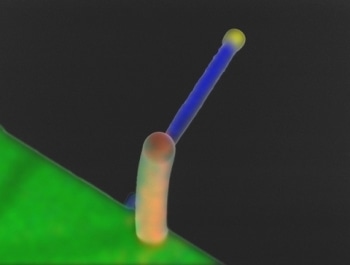Jun 24 2016
Researchers of the Nanomagnetism Group and Electron Microscopy Group at CIC nanoGUNE devised and demonstrated a novel approach to nanoactuation that relies on magnetomechanics instead of the conventional electromechanics utilized in micro and nanoactuated mechanical systems. The work was reported in Small.

Actuators for manipulating objects on the nanometer scale are expected to be a key advance in nanotechnology in the upcoming decades. Actuators operate by converting external stimuli into mechanical motion that can then be harnessed to do work or move objects. While actuation at the micrometer-scale has been widely explored and generally achieved through micro-electro-mechanical-systems (MEMS), their reduction to the nanometer-scale (nano-electro-mechanical-systems, NEMS) and the search for alternative technologies for nano-actuation are still being investigated on a fundamental level.
Remote control actuation goes down to nanoscale
Exploiting the versatility of advanced 3D fabrication process of magnetic nano-structures by focused-electron-beam-induced deposition, Paolo Vavassori and co-workers propose, fabricate and demonstrate nano-actuated magneto-mechanical systems (NAMMS) devices that convert remote magnetic stimuli into mechanical motion with sub-nanometer control. Since remote-activation does not require physical contacts, NAMMS have the potential to operate in diverse environments, such as liquids or even inside living organisms, opening new avenues to key future applications in biology, medicine and nano-robotics.